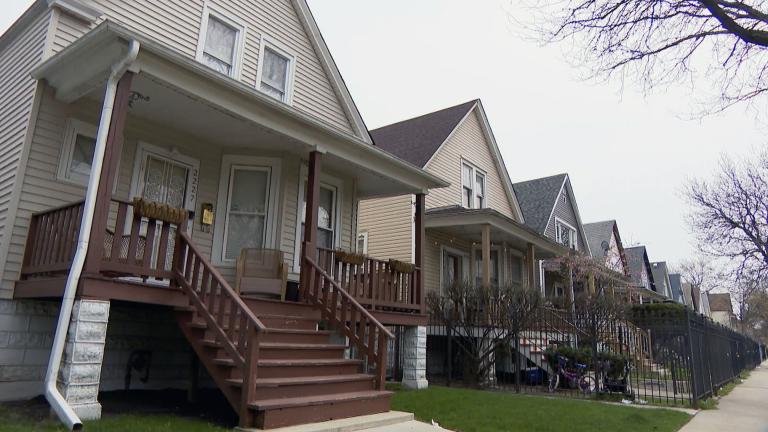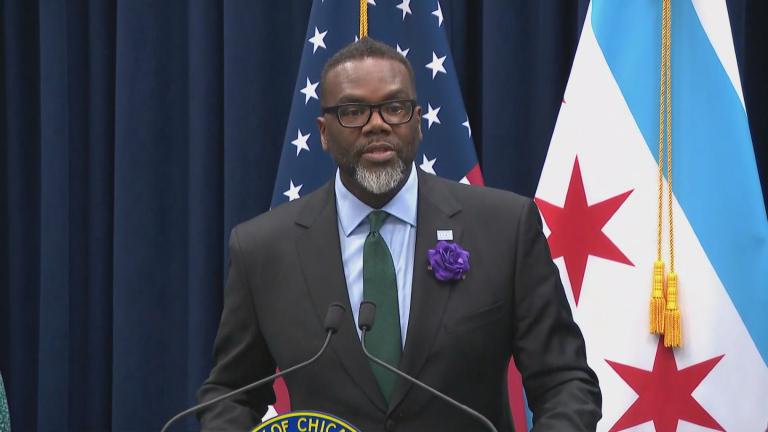Mayor Lori Lightfoot’s proposal to spend $16.4 billion in 2023 is set for a final vote on Monday, even as she rebuffed efforts led by members of the Progressive Caucus to create a Department of Environment to step up efforts to combat climate change in Chicago.
Both the City Council’s Budget and Finance committees voted to advance the spending plan to the full City Council, teeing up the two-step process that is scheduled to start Friday and culminate Monday, precisely 35 days after Lightfoot unveiled the final budget of what she hopes will be her first term in office. Lightfoot will ask voters for a second term on Feb. 28.
But the hours of debate on Tuesday and Wednesday made it clear that the mayor’s attempt to mollify alderpeople calling for the creation of a standalone Department of the Environment by modifying her proposal to instead create an Office of Climate and Environmental Equity fell far short and may complicate the passage of the budget plan.
Although Lightfoot first proposed that office would be part of the mayor’s office, she agreed to allow it to operate independently and to increase its size from six employees to 10 employees. The office’s budget would increase by more than 33% from the mayor’s initial proposal to $1.04 million, under the revised proposal that advanced Wednesday.
Budget Director Susie Park also vowed to conduct a study during the next seven months about how to transform that office into a fully fledged department, calling the changes embraced by the mayor “a good first step” toward creating a “robust” department.
But those changes were not good enough for Ald. Carlos Ramirez Rosa (35th Ward), who blasted the mayor for failing to live up to her promise during the 2019 campaign to re-establish the department axed by former Mayor Rahm Emanuel for disbanding it as part of Chicago’s 2012 budget.
Ramirez Rosa, who has endorsed Cook County Commissioner Brandon Johnson in the race for mayor, called Lightfoot’s refusal to fulfill her campaign promise “insulting,” ”disingenuous” and “disrespectful to the people who voted for change.”
Ald. Harry Osterman (48th Ward) said he was perplexed by the mayor’s insistence that the creation of a new department required a study, noting that the Department of Housing was relaunched in 2019 without one. Nor did Lightfoot demand a study before creating the Office Public Safety Administration, he said.
“This is a headscratcher,” Osterman said.
Facing a tough re-election bid, Lightfoot has touted her 2023 spending plan as the best way build on what she says are her progressive accomplishments, even as spent nearly her entire term at odds with Chicago’s progressive political community.
Four candidates have announced plans to challenge Lightfoot from the left, including Johnson, Ald. Sophia King (4th Ward), Ald. Roderick Sawyer (6th Ward) and activist Ja’Mal Green. U.S. Rep. Jesús “Chuy” Garcia has not ruled out a run for the 5th floor office at City Hall.
Lightfoot’s 2022 spending plan would not have passed without the support of progressive members of the City Council, with Ramirez Rosa and others endorsing that plan after the mayor agreed to boost spending on mental health services and affordable housing programs.
Those votes proved critical a year ago, with the most conservative members of the City Council voting against the spending plan because of their concern it did not do enough to address the city’s violence problem by hiring more members of the Chicago Police Department.
All of those City Council members voted against the mayor’s 2023 spending plan during committee votes on Tuesday and Wednesday, making it clear that if Lightfoot is to pass her fourth budget, she will have to convince at least some progressive City Council members to vote for it.
However, Lightfoot’s proposal to use $242 million from the city’s surprise surplus to pay down the city’s massive pension debt generated no controversy after the top finance officials defended it as a prudent measure and it was blessed by a Wall Street ratings agency.
Lightfoot’s budget proposal calls for the city to spend nearly $3.3 billion on public safety, an increase of more than $100 million from 2022.
The Chicago Police Department’s budget is set to increase by $64 million to a total of $1.94 billion. However, the department is only slated to add 35 positions.
The department is also set to increase spending significantly on the number of officers assigned to patrol the CTA, with that budget jumping from $10.7 million in 2022 to $30 million in 2023. In recent months, a number of high-profile shootings and stabbings have grabbed headlines and led many Chicagoans to question whether it is safe to ride the CTA.
Chicago’s 2023 spending plan is the first that will reflect revenues from a casino, with Bally’s cutting the city a $40 million check after the City Council gave their plan to build a casino and resort in River North the green light. A temporary casino is set to open at the Medinah Temple next summer.
In addition, city officials will use $152.4 million from the federal COVID-19 relief package signed into law by President Joe Biden in March 2021 to make up for revenues that suffered during the pandemic.
Hearings on the budget were marked by frustration that Chicago officials have only spent $130.5 million of the $1.227 billion Chicago Recovery Plan, according to data released as part of the mayor’s 2023 budget proposal.
Fueled with federal funds, that plan earmarks tens of millions of dollars for a host of programs including affordable housing, mental health, violence prevention, youth job programs and help for unhoused Chicagoans.
Contact Heather Cherone: @HeatherCherone | (773) 569-1863 | [email protected]






